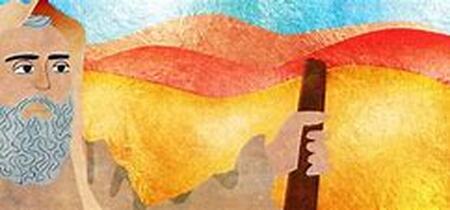
Moreover, I have [also*] heard the groaning of the people of Isra'el, whom the Egyptians are keeping in slavery; and I have remembered my covenant. (Exo 6:5)
*The Hebrew has the word, 'also'.
WE SHOULD EMPATHIZE WITH THE PROBLEMS OF OTHERS EVEN WHEN WE OURSELVES ARE SUFFERING.
In Chasam Sofer, Rabbi Moshe Sofer explained why the word 'also' is included in the verse though it may seem superfluous (and there are no superfluous words in the Torah).
He says that by it is inferred that it is not only HaShem who heard the 'groanings', but the people also heard one another's cries. Even though the entire Jewish people were enslaved and afflicted, they did not forget the plight of their fellowman.
By this, HaShem encourages us not to be so wrapped up in our own problems that we forget to empathize and be concerned for the plight of those around us, who may after all be under a heavier burden that we are, while out of concern for others refuse to impose their burdens on those around them through verbal complaints.
Here is a little anecdote about this.
The mother of Rabbi Simcha Zissel Ziv has a custom to collect money for the poor at funerals. At the funeral of her only daughter, she also collected charity. When asked how she was able to compose herself at the height of her grief, she replied, "Just because I am suffering doesn't mean that the poor have to suffer also." (Tnuas Hamussar, vol. 2, p. 28).
Our Master has certainly left us an example to follow on this matter.
He Himself is described by Isaiah the prophet as, ... a man of pains, well acquainted with illness. ... Though mistreated, he was submissive -- he did not open his mouth. Like a lamb led to be slaughtered, like a sheep silent before its shearers, he did not open his mouth. (Isa 53:3-7 CJB)
Fully aware of what expected Him within the next few days in Jerusalem, He stopped on His way to comfort Lazarus' two sisters who had just lost their brother. Yochanan records that at that moment,
Yeshua cried; (Joh 11:35 CJB).
Anticipating the soon coming destruction of the Temple and of the city, even at the height of His suffering, He made sure to empathize with the 'daughters of Jerusalem' saying,
"Daughters of Yerushalayim, don't cry for me; cry for yourselves and your children! (Luke 23:28).
While Himself unjustly hanging on the tree, He cared for the thief who, admitting his guilt, begged to be 'remembered',
"Then he [the thief] said, "Yeshua, remember me when you come as King." Yeshua said to him, "Yes! I promise that you will be with me today in Gan-`Eden." (Luke 23:42-43).
Finally, just before the end, our Master also made sure that His mother, as well as His youngest disciple, would be cared for after His departure,
"When Yeshua saw his mother and the talmid whom he loved standing there, he said to his mother, "Mother, this is your son." Then he said to the talmid, "This is your mother." And from that time on, the talmid took her into his own home. (John 19:26-27).
But we might say, "Oh, but this is Yeshua! He can do that, but we can't!" Let' play with that self-absolving argument. When Aaron lost his two sons, he was in the middle of a great dedication ceremony, but the faithful Levite refused to mourn while in the service of HaShem. Not only did he not want to draw negative attention away from this very important moment and to himself, but he also didn't want to dampen the joy it meant for the people of Israel. Later, he went to mourn his two sons in the privacy of his own tent with his own relatives.
*******
Paul, The Master's dear apostle gave us a commandment to practice empathy. he instructed us to,
"Rejoice with those who rejoice, weep with those who weep." (Rom 12:15).
This command doesn't seem to be conditional to our state of mind at the time. Following Yeshua's example, we are not to indulge in burdening others with our problems, but are to be aware and concerned with their problems.
NOTE: All that said, it doesn't mean that we shouldn't share our personal issues with others in order to get help, counsel, prayer, or even comfort and sympathy, but we are to do so in private, with the leaders of the congregation so as not to burden the whole congregation with our personal issues. While we are to give that sympathy, we are not to indulge in milking it from others. Sad to say, congregation 'prayer requests' times are often hijacked into 'pity parties'! We must remember what the dear apostle also said to the Roman congregation,
'There is more happiness in giving than in receiving.' (Act 20:35 CJB)
Following the example of the Master, while ujustly imprisoned Paul, and Silas his travelling companion, cared more for their jailer than for themselves and even for their own freedom. Here is the account that Luke, Paul's biographer, left us regarding that episode,
The mob joined in the attack against them, and the judges tore their clothes off them and ordered that they be flogged. After giving them a severe beating, they threw them into prison, charging the jailer to guard them securely. Upon receiving such an order, he threw them into the inner cell and clamped their feet securely between heavy blocks of wood. Around midnight, Sha'ul and Sila were praying and singing hymns to God while the other prisoners listened attentively. Suddenly there was a violent earthquake which shook the prison to its foundations. All the doors flew open and everyone's chains came loose. The jailer awoke, and when he saw the doors open he drew his sword and was about to kill himself, for he assumed that the prisoners had escaped. But Sha'ul shouted, "Don't harm yourself! We're all here!" Calling for lights, the jailer ran in, began to tremble and fell down in front of Sha'ul and Sila. (Act 16:22-29 CJB)
Paul's motto was,
When we are cursed, we keep on blessing; when we are persecuted, we go on putting up with it; (1Co 4:12 CJB)
James, the Master's brother, also tells us how to handle the adversities of life in,
Regard it all as joy, my brothers, when you face various kinds of temptations; for you know that the testing of your trust produces perseverance. But let perseverance do its complete work; so that you may be complete and whole, lacking in nothing. (Jas 1:2-4 CJB)
What I feel about this is that, if we do not know how to take today's afflictions with patience and joy, how will we be able to emulate the example of the early Jewish messianic martyrs whom the writer of the Letter to the Hebrews (Jewish believers in first century Israel) challenges with,
What more should I say? There isn't time to tell about Gid`on, Barak, Shimshon, Yiftach, David, Sh'mu'el and the prophets; who, through trusting, conquered kingdoms, worked righteousness, received what was promised, shut the mouths of lions, quenched the power of fire, escaped the edge of the sword, had their weakness turned to strength, grew mighty in battle and routed foreign armies. Women received back their dead resurrected; other people were stretched on the rack and beaten to death, refusing to be ransomed, so that they would gain a better resurrection. Others underwent the trials of being mocked and whipped, then chained and imprisoned. They were stoned, sawed in two, murdered by the sword; they went about clothed in sheepskins and goatskins, destitute, persecuted, mistreated, wandering about in deserts and mountains, living in caves and holes in the ground! The world was not worthy of them! All of these had their merit attested because of their trusting. Nevertheless, they did not receive what had been promised, because God had planned something better that would involve us, so that only with us would they be brought to the goal. (Heb 11:32-40 CJB)
MAY WE, WITH ALL THE MARTYRS OF THE FAITH THROUGHOUT THE AGES, TAKE OUR TRIALS AND TRIBULATIONS PATIENTLY.
MAY WE, LIKE THE MASTER, USE THEM AS A LEARNING EXPERIENCE TO PROVOKE IN US EMPATHY FOR OTHERS, RATHER THAN SYMPATHY FOR OURSELVES.
R' Gavriel Lumbroso

 RSS Feed
RSS Feed